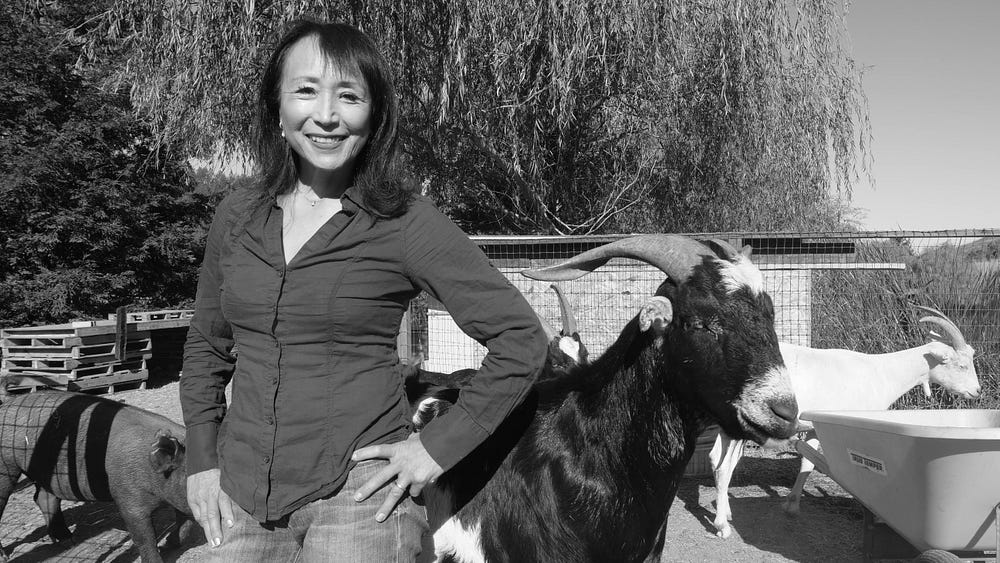Miyoko Schinner, the Premier Pioneer of Plant-Based Cheese
A window into the winding, trying, and inspiring making of a movement


This is not your typical Silicon Valley entrepreneur’s journey.
Miyoko Schinner had a startup — and life — mentor from the time she was young: her mother.
Born outside Tokyo in the 1950s, Miyoko witnessed a bustling business in her home growing up until she was seven. Her mother set up a stuffed-animal business, employees and all, in their living room. She was also a single mother then — rare both in Japan and at the time.
“I grew up with a different idea of what women could be — I never thought about a woman being a housewife and that was it. It was my reality.”
They eventually moved to Mill Valley when her parents decided to reunite. Together her parents started a novelty business but struggled mightily to get it off the ground for a number of years in the 1960s. She remembers their refrigerator breaking, and unable to afford a fix, her father placing a huge ice cube in the fridge — turning it into more of an ice box. They worked all the time and never took vacation. After years of hard work, their business began to grow, expanding out of their home to one, two, and eventually three factories. Due to their hard work and determination, they did well and “moved up in life.”
“I had the benefit of seeing how my parents could grow the businesses. At the same time, I saw how hard they worked and how overwhelming it could be. I never saw my parents working for anyone.”
Her postsecondary education also helped her “learn to learn.” She attended St. John’s College in Annapolis, Maryland, a small liberal arts school whose curriculum eschews textbooks in favor of the Great Books Program pioneered by the University of Chicago in the 1930s. She majored in philosophy with a minor in mathematics and learned that she could figure out anything on her own. “It removed the fear of learning for me.”

Hard Lessons: The Japanese Mafia and Backpacks Filled With Pound Cake
Her education in the kitchen started long before college.
At 12, Miyoko was placed with a small group of vegetarians on a school camping trip, and she was converted by the time she returned home. Becoming vegetarian was more an act of rebellion than anything, but her reaction to meat from then was visceral. “My mom put a pork chop in front of me when I got home, and I pushed it away. My desire for meat disappeared overnight.”
Believing she’d be “over it” within a week, Miyoko’s mother initially prepared vegetarian meals for her. The honeymoon ended after week two with clear instructions from above: If you want to be a vegetarian, you’re on your own at mealtime.
“I was willful and determined and wasn’t going to let anyone talk me down from anything. I quickly became interested in both cooking and nutrition, reading books by authors like nutritionist Adelle Davis — and began eating lots of eggs and dairy.”
The dairy, however, became a problem. After moving back to Japan on her own in 1980 she was subsisting on a diet rich in fancy cheeses, butter, and cream. She began experiencing stomach issues, and a friend suggested it may be related to the dairy. After reading up on the topic she decided to give it up, and her health returned shortly after. From then on, she was plant-based all the way.
But there was a snag: “[Dairy] was in everything I made. And I loved deserts,” she said.
With this realization, her first business was born: a little bakery whose goal was to capture all the flavors that dairy had to offer without the dairy. Her debut product was a 100%-plant-based pound cake. Three days a week she baked the goods in a commercial bakery 90 minutes outside Tokyo, and three days she delivered them around town in a 70-pound pack containing 70 cakes on her back.
At the same time, Miyoko was experimenting with vegan cuisine on the side — actually, with many side hustles: running 10-course vegan tasting nights, designing menus for restaurants, conducting cooking demonstrations in department stores, and consulting for a natural-foods distributor. Schlepping pound cake in a backpack quickly lost its appeal, and she considered opening a restaurant, with a new business partner to help finance the outfit.
While the restaurant concept was picking up steam, her business partner had other ideas. Not long after linking up with him, she learned of his connections to the Yakuza, a notorious Japanese gang. After a string of terrifying events — from threatening phone calls to men banging on her door at 3 a.m. — she decided to leave Japan altogether and head back to the United States.
The Product R&D Years: Airline Cookies, Meatless Turkeys, and Vegan Restaurants
Miyoko wasted little time getting back into the kitchen. Shortly after returning, she was baking vegan cakes in her home and selling them to Whole Foods stores all over the Bay Area, delivered fresh from the trunk of her Volvo station wagon. Eventually she rented space in a retail kitchen, and with some seed money, opened one of the first fine-dining vegan restaurants, Now & Zen, in 1994.
“My goal was to prove to the world that vegan food could be upscale, delicious, and fabulous.”
Now & Zen had its ups and downs, as small operations often do: chefs walking out on the job mid-shift with all the burners ablaze, managers disappearing into the night with the shop’s finest wine in tow, and other oddities of the restaurant business. “There were no systems in place for controlling things like today,” she said. “We were struggling, but we did get a lot of press.” Miyoko had also had a couple of kids during these somewhat-tumultuous times.
To supplement the restaurant revenue, Miyoko started mass producing one of its signature dishes: the UnTurkey (in one weekend at the Natural Products Expo, she walked out with $50,000 in orders). As sales of the UnTurkey rose, she started to fill the product pipeline with UnRibs, UnChicken, and UnSteakout. Before she knew it, Miyoko was now also operating a self-funded natural-foods business.
Then came the airline cookies. Yes, airline cookies.
“United Airlines was looking for a low-fat, low-sugar, dairy-free cookie. So I went into the kitchen, made them, and sent them off. Two weeks later we had an order from United Airlines and were making 10,000 cookies a day for United Airlines. If you requested a special meal, you’d get a Miyoko’s Cookie. We did this for almost five years.”

The Plant-Based Phoenix Rises
Come 2003, she was stretched thin and exhausted, personally and professionally. “Over these years I had three little kids, a mother dying of cancer, and a father I had to take care of. I sold the natural-foods business to get out of debt. It was a really difficult period.” After selling the business, her husband took her on a vacation for the first time in years. On the plane to France, she fainted.
“They wanted to turn the plane around, and my husband said ‘Don’t turn the plane around, she just needs a vacation.’” I was an emotional wreck because I had failed at this business. I felt like a big failure. I’d worked so hard, and it failed.”
Soon after she went to work at her husband’s law firm as his controller, and eventually became a qualified intermediary doing 1031 exchanges in real estate deals. It turned out her education reading the Great Books in college was excellent training for wading through dense language within the IRS tax code. She started her own business making “great money,” bought a house in Marin, and settled into a good life. It didn’t last long.
“A few years in, I realized how empty I felt. I asked myself, ‘Is this it? Have a glass of wine when I get home, take care of the kids, and watch TV every night? Is this it?’”
She had drifted from her passion of making delicious food with an impact, and had had enough of life in the slow lane.
“I’d been working on vegan cheeses, just playing around in the kitchen, amassing a number of recipes. I finally said, ‘I’m 50 years old, I have nothing to lose.’ My first vegan cookbook came out in 1990, before the internet. All of a sudden there were bloggers and more, and I thought, ‘How am I going to get back in the game?’ The only way was to develop something earth-shattering.”
Her book, Artisan Vegan Cheese, was a hit. On her book tour she’d reconnected with friends and colleagues in the industry, one of whom was a former UnTurkey competitor from years before: Seth Tibbott of Tofurkey. After sampling her cheese, he offered to be her first investor on the spot. “I felt like everything I touched turned to ash, but Seth gave me a real confidence boost.”
In six weeks in 2014, Miyoko raised $1 million, with an initial idea of opening a little cheese shop in Fairfax, California, with an accompanying e-commerce business. “There was no business plan beyond that. I really didn’t think it would take off.”
The first Friday in September 2014, Miyoko’s Kitchen went live online. By Monday, it had more than 500 unique orders, averaging $100 each. Needless to say, the little cheese shop never opened, and Miyoko began selling to distributors. The rest of the story is playing out before us all at Trader Joe’s, Whole Foods, and natural-foods stores around the country.

A Revolutionary in Capitalist Clothes
Miyoko is aware of the challenges she faces in the dairy industry, and as a leader herself.
“It’s been a learning experience for me to be a CEO. Stepping into those big shoes. I’m in a couple CEO [peer] groups, I have a coach, and am learning to be a great leader. I’m constantly learning how to do this better.”
One of her areas of focus is growing a company culture that keeps people excited and motivated, pure and simple. It’s hard work — and a work in progress: “In the beginning, it seemed great. When we hit 30 people, it started falling apart, and we knew we had to fix it. Now that we’re over 80, I feel like the culture is better than ever.”
She views the company as a programmable venue dedicated to a bigger mission. It screens films, invites guest speakers, hosts group discussions on food choices and environmental impact, and has a full-time chef and sous chef who serve meals to all employees free. It’s all based on a simple premise: “We’re in this together to make a better world.”
She continues:
“We want to be the leader in this space. We’re not just selling cheese — we’re revolutionizing dairy with plants. This will be the new norm in a matter of years, not decades.”
As we wrapped up, Miyoko made mention of misreported news that Miyoko’s Kitchen was being acquired by Nestlé. Some of her fiercest devotees were devastated and angry, taking to social media to protest. After quelling the protests, she reflected on the advantages of plant-based startups working with Big Food categorically. “Because of companies like Beyond Meat and Memphis Meats, Tyson [which invested in both] is now headed in a different direction.”
“We have the opportunity to change the trajectory of some of these bigger companies. David now has the chance to preach to Goliath and help him see the light.”

